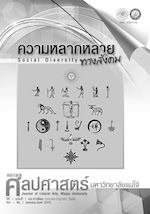พฤติกรรมส่งเสริมสุขภาพของนักศึกษามหาวิทยาลัย (Health Promoting Behaviors of University Students)
Main Article Content
Abstract
The purposes of this research were to study health promoting behaviors, to compare health promoting behaviors, and to study the correlation between cognitive-perceptual factors of Maejo university students. This research was an exploratory research using questionnaires collected from the sampling group of 388 students. The data obtained were analyzed by computer program. The statistics used were Frequency distribution, percentage, mean value, standard deviation, t-test, One-way Analysis of Variance, and Pearson Product Moment Correlation Coefficient. The results of the study indicated that the health promoting behaviors of students were generally in the moderate level. Moreover the results revealed that the students who had different modifying factors including gender, age, faculty enrolled, monthly incomes, and education level of parents would have different health promoting behaviors at .05 of significance. The results also pointed that the cognitive-perceptual factors of health promoting values, health promoting attitudes, perceived self efficacy towards health promoting, and perceived benefit of health promoting behaviors had positive correlation with health promoting behaviors of students at .05 level of significance. And, perceived barrier of health promoting behaviors had negative health promoting behaviors of students at .05 level of significance. The study suggests that should promote perceived self efficacy in health promoting behaviors. Knowledge on heath promoting behaviors as its necessary should have developed continuously. The university should provides health promoting activities concerning; nutrition, exercise, stress management, and accident prevention, for the students in order to develop into positive health promoting behaviors.

